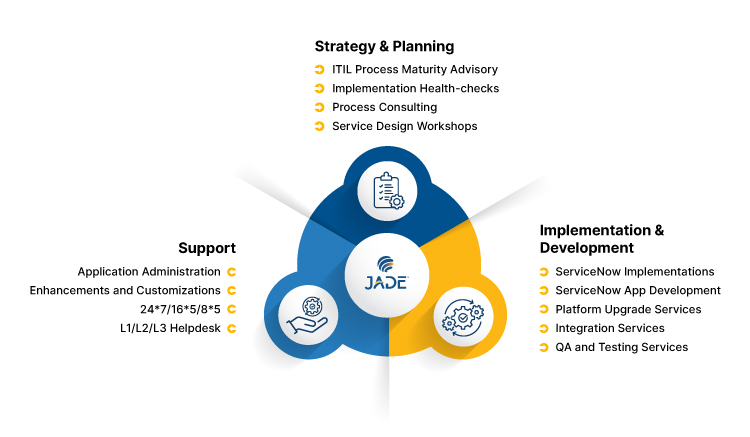In today's world, there is a big question in front of IT leadership to find a tool or solution that can help manage the revenue and value while meeting goals, demand, resources & investment.
ServiceNow Portfolio Management with Financial Management
Due to the lack of proper strategic management tools, some parts (~10%) of the project budget are lost. To align investment in strategic direction with implementing strategy and delivering business objective/goal, top leadership need the right tool to help make decisions quickly and respond to demand.
ServiceNow Strategic Portfolio Management provides methods, standards, processes, and tools to deliver the Business Strategy by focusing on the organizational strategies to achieve the vision and mission of an organization.
ServiceNow Strategic Portfolio Management provides a single platform to manage, plan and execute strategies organization wide. The essence of the tool is collaboration & integration with other industry-wide tools such as JIRA, Teams, Slack, Salesforce, etc., which make SPM reach broader audiences and serve the organization's needs without impacting the current structure.
We can realize long-term benefits by combining ServiceNow Strategic Portfolio Management with Financial Management.
ServiceNow Strategic Portfolio Management with Financial Management provides the capabilities that mainly focus on
- Financial and Portfolio Visibility
- Align Portfolio Goals
- Accelerate Delivery

Gain Financial and ServiceNow Portfolio Management Visibility
Channelizing the funding or budget is the biggest challenge. It helps to choose financial modeling and planning. There are two approaches: -
- Top Down– This top leadership team allocates budget to Business Units per the organization's strategic goals.
- Bottom Up– In this Business Unit, leaders ask for a certain budget from top leadership to achieve or deliver services to various clients, keeping the organization's strategies in focus.
This will give the top leadership team a comprehensive view to focus on and decide where to invest. Also, it helps them to prioritize the investment based on the organization's growth path.
Financial outflows - SPM, with Financial management, can provide the service offering cost model. The top leadership can use to evaluate the amount spent, allocate expenses, and generate cost baselines based on the budgeted cost for an organization using a service offering map.
Align ServiceNow Portfolio Management Goals
Encompasses mainly: -
• Application Portfolio Management (APM)– Provides the business capability map to the leadership. It helps them to make strategic direction regarding which application or business they need to investment keeping the strategic goals in focus. It also helps the business unit leads with budgeting during the bottom-up approach.
• Project and ServiceNow Portfolio Management (PPM)– Entire project management lifecycle. Prioritize goals, objectives, etc., and help maximize the ROI and drive strategic outcomes by meeting the resource and demand management.
Financial Return - It's becoming essential to calculate the financial return of each project to identify the potential portfolio of projects to be delivered by business units to achieve organizational goals. PPM modules help calculate a project's ROI (Return on Investment). ROI is a critical indicator for the top leadership team to understand the profit margins and investment risks. In some projects, it's easy to calculate in terms of production increase, market growth, etc. in other projects where we have intangible outcomes, it's difficult to convert them into measurable results to calculate.
SPM with ServiceNow Financial Management can help top leadership understand the ROV (Return on Value), as it is becoming a significant way to demonstrate how IT initiatives can generate value for an organization and its clients. It's not that ROV delivers benefits or financial gains overnight. In turn, it delivers gains over time by converting the intangible benefit to financial realization. ROV can be used to value the business, strategies, services, processes, people, and operations. With the successful system in place, the following value factors can be reported: ROV competitive advantage, optimization of services or assets, and better customer experience.
Accelerate Delivery
As part of the transformation, organizations are moving today's Agile methodologies alongside traditional waterfall project management—a hybrid approach. Agile development framework gives the flexibility to meet the changing business requirement and competitive market product, which in turn builds confidence & value of the organization.
Conclusion
Investing in organized, planned, and successful implementation of SPM with Financial Management helps to achieve business outcomes, balance demand, help increase business swiftness and grow the organization by maximizing the potential of organization resources.













